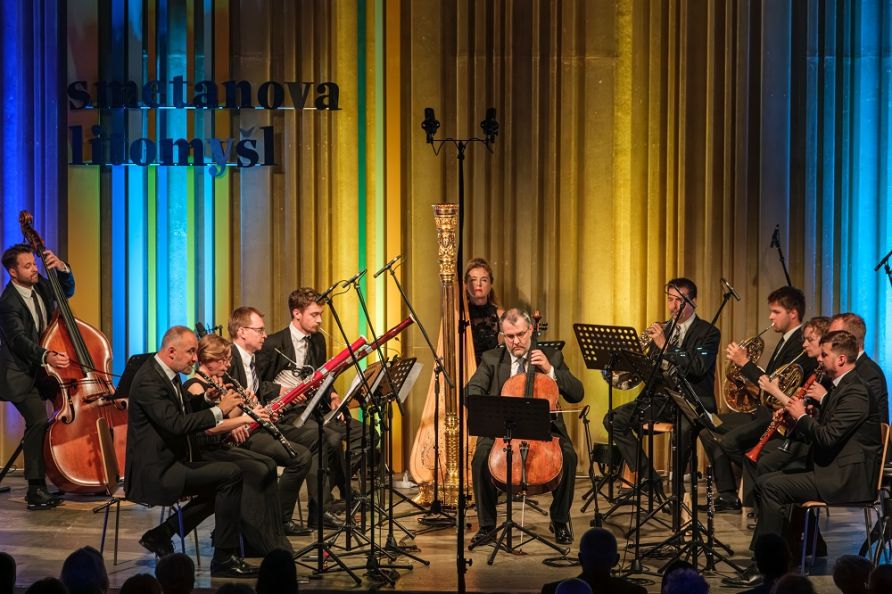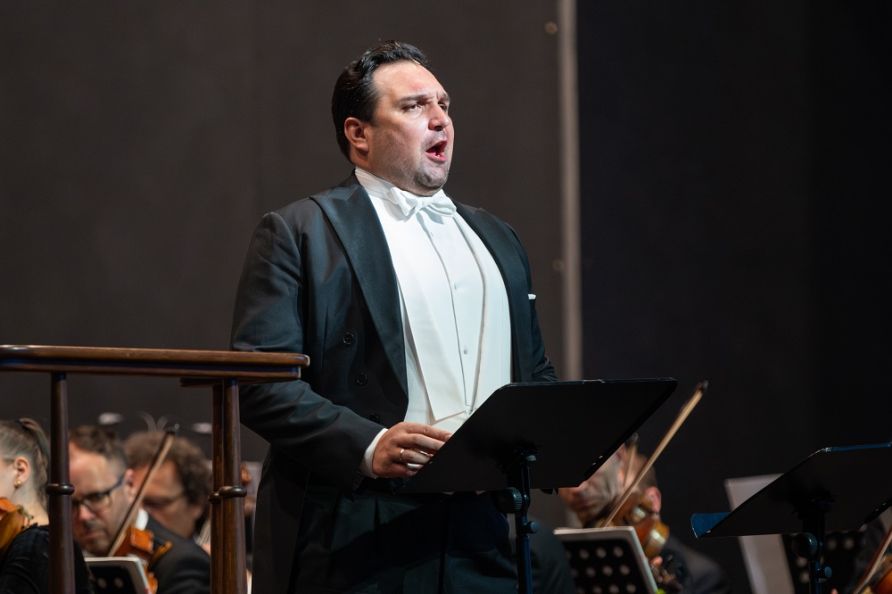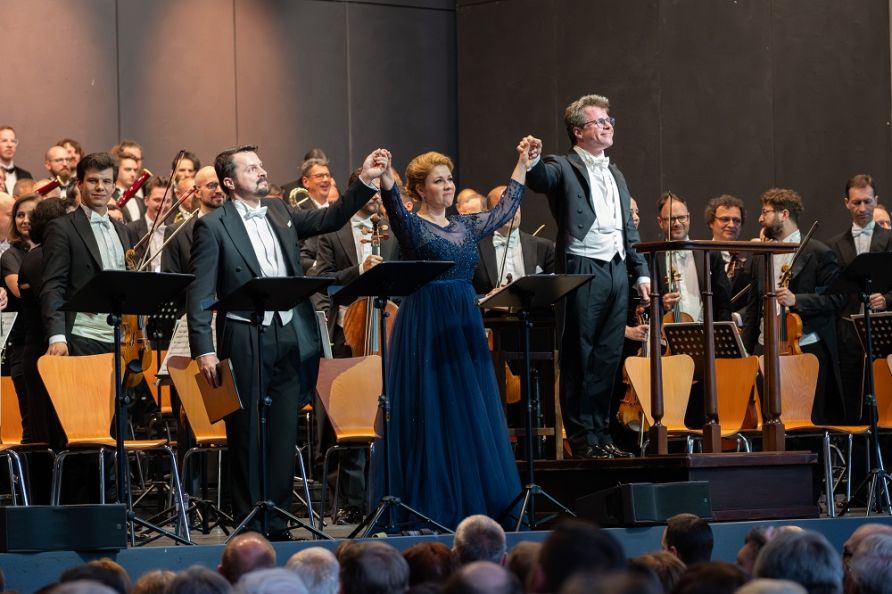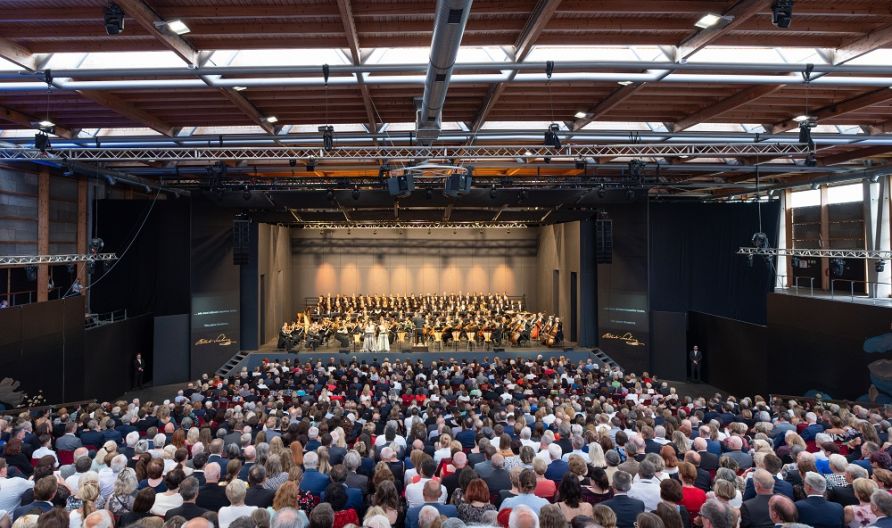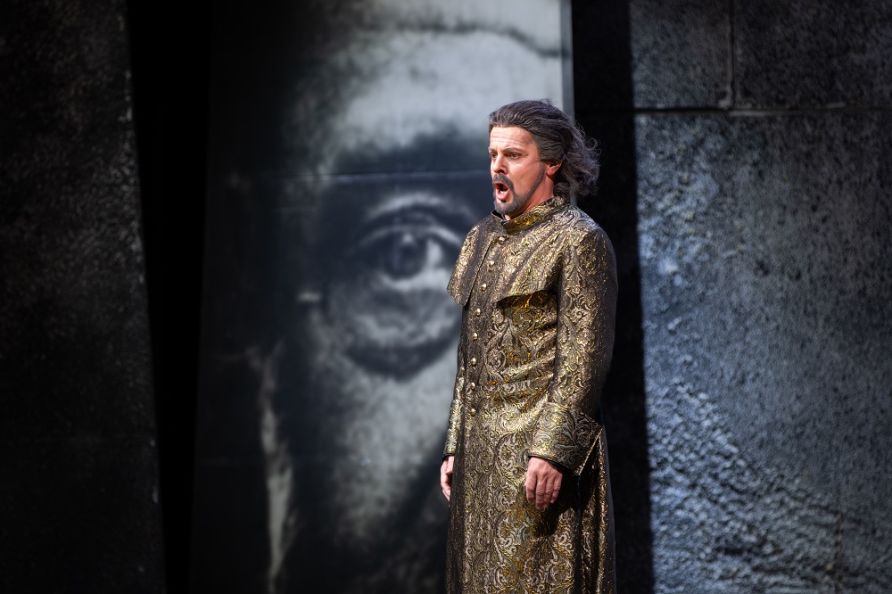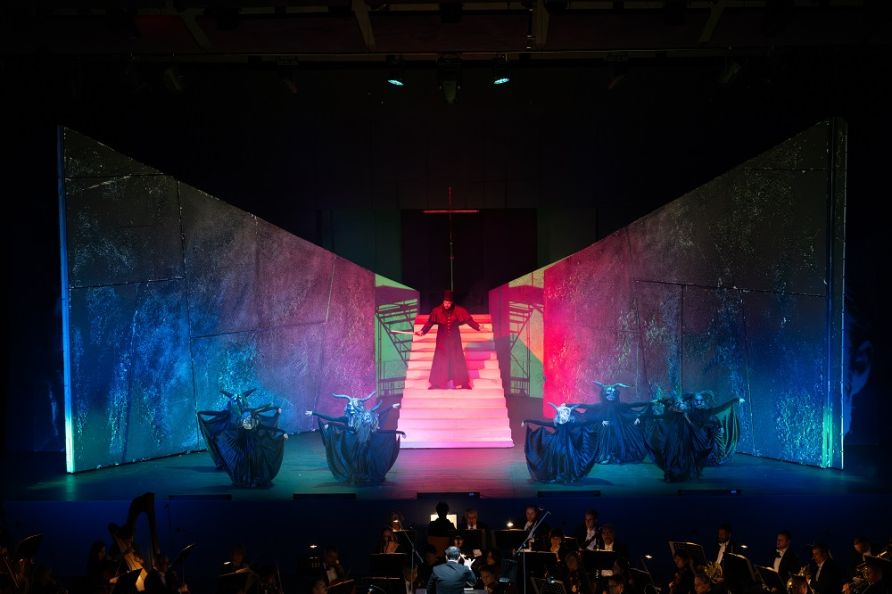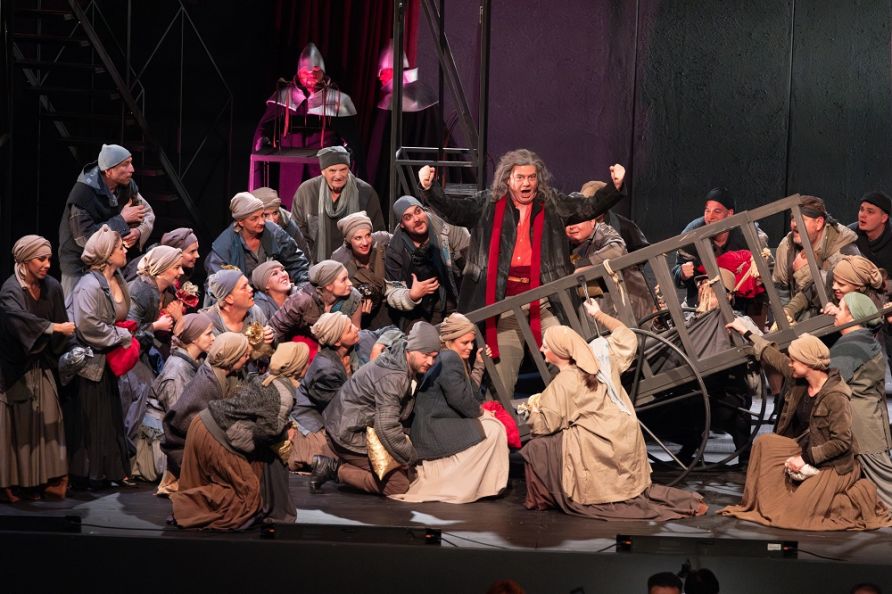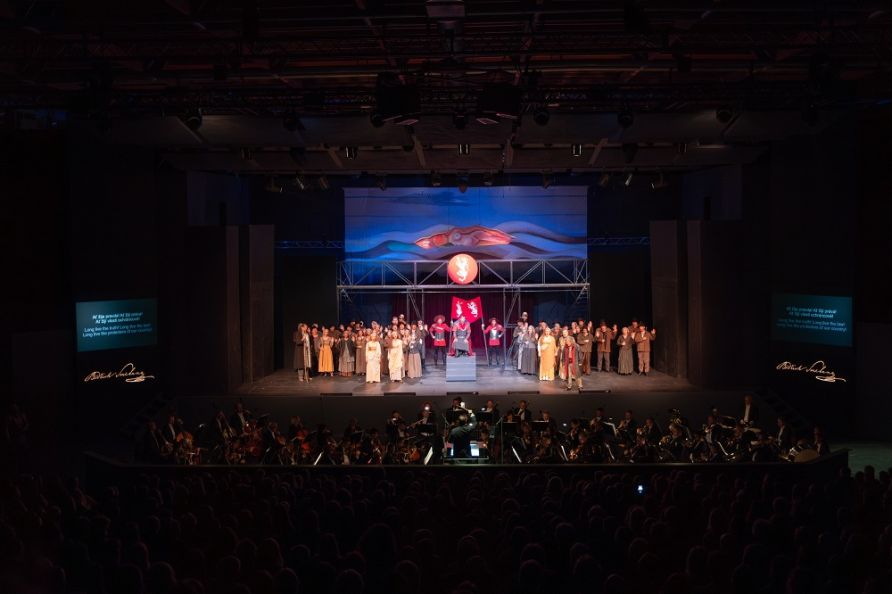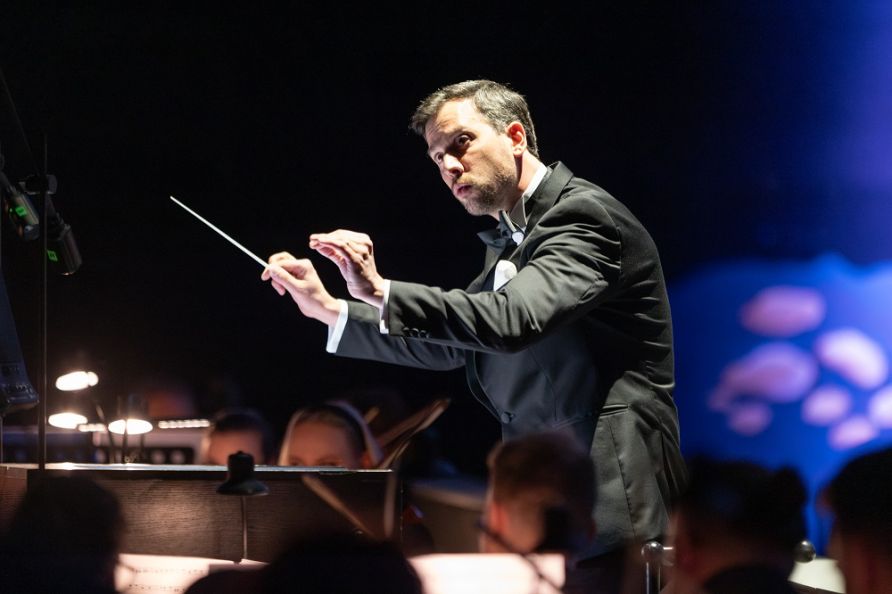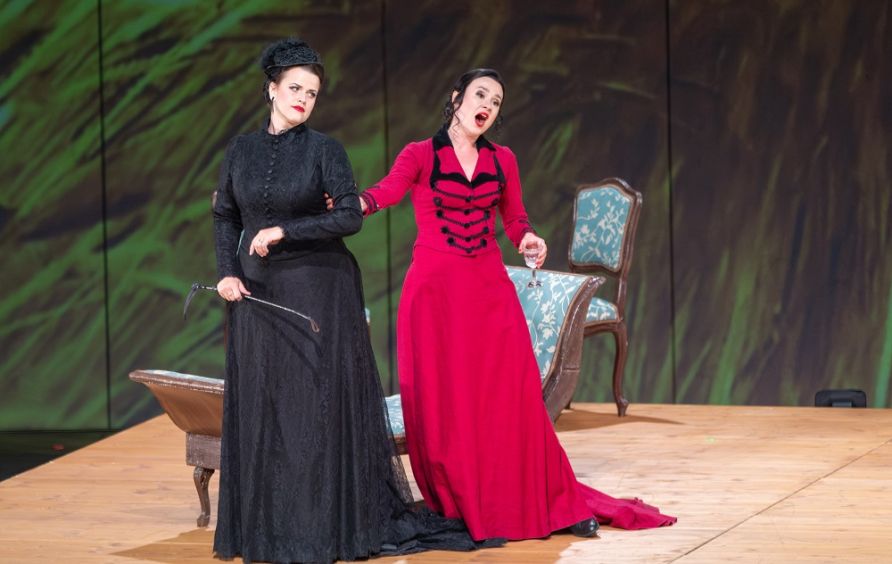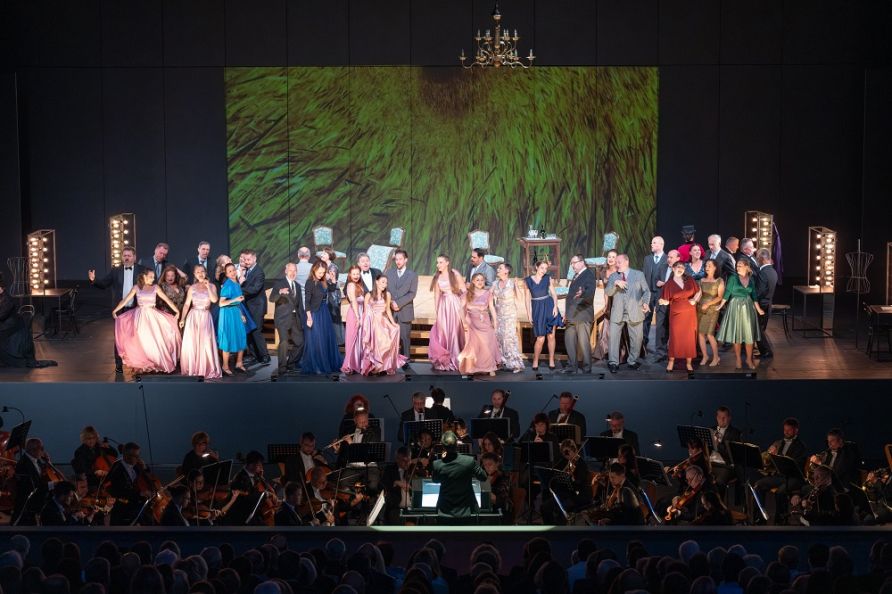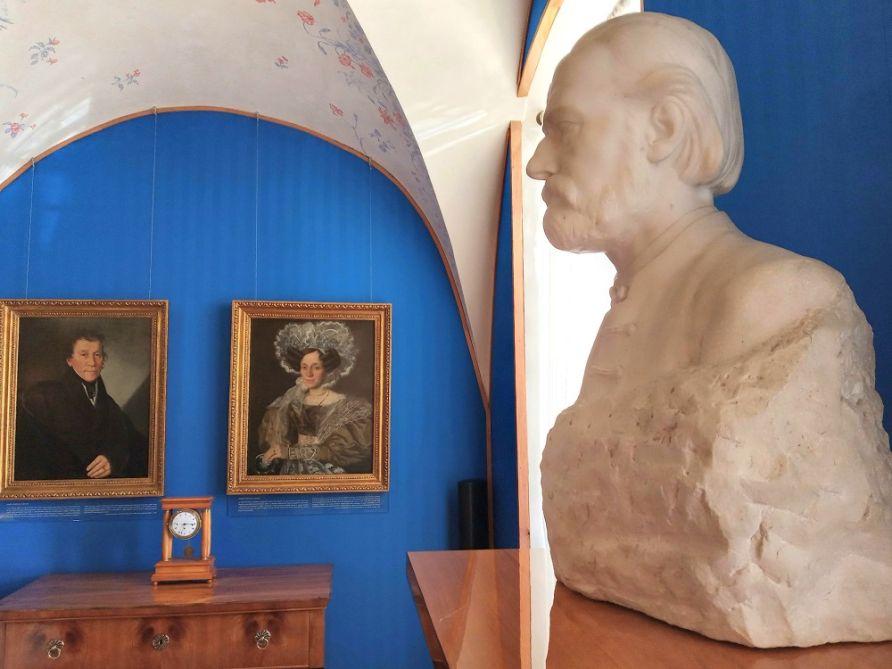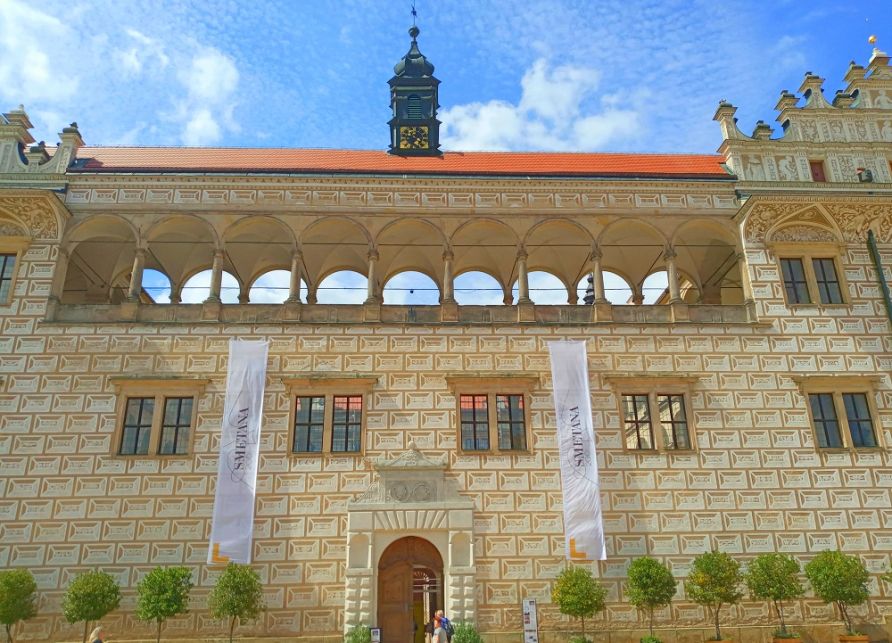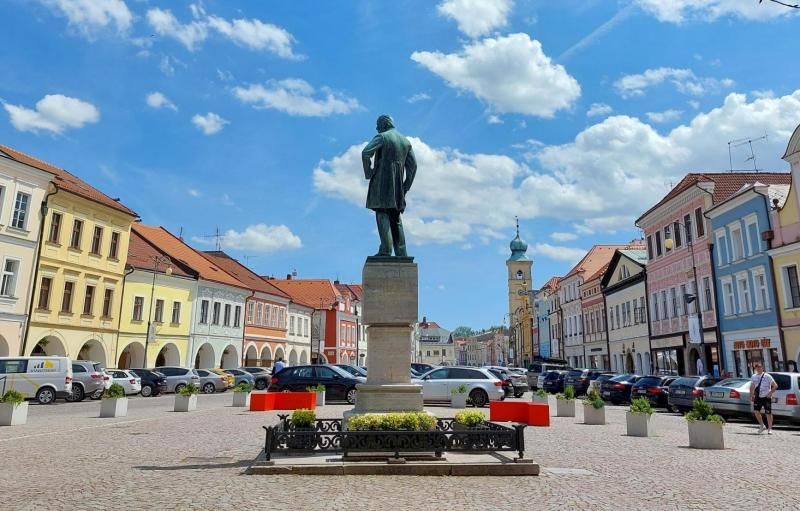theartsdesk at Smetanova Litomyšl: three fascinating operas and a masterpiece superbly vindicated
Smetana 200 celebrated with a feast on a scale only possible in his native Czechia
Copied from: theartsdesk
What did they put in the water of Czechia’s central Bohemia/Moravia borderlands? From south to north there's Mahler’s birthplace in Kalište and the city of his youth, Jihlava; the Polička tower where Martinů was born; and finally the Litomyšl brewery which was Smetana’s first home (further east, Janáček and Freud were born six kilometres apart).
Unquestionably Litomyšl is the loveliest of the four places, with an elongated square flanked by arcaded buildings – one day they’ll remove the parking spaces – below the UNESCO listed Renaissance castle (lavish restoration ongoing, so courtyard unavailable for performances over the past two years, facade pictured below), and as the home of Czech music’s founding father, every summer it hosts a festival dedicated to Bedřich Smetana (1824-1884). 2024’s is exceptional, covering all the operas in bicentenary celebrations that also coincide with the Year of Czech Music, and it runs for nearly a month, with art and poetry also featured, as they are throughout the year, impressive in a town of around 10,000 inhabitants.I wouldn't have thought the place would sustain two full days' exploration, but it absolutely did (that excursion to Olomouc will have to wait, though we were driven south to Mahler territory, an exhilarating trip which deserves an article in itself; Polička I'd seen, and climbed the church tower to the tiny room above the bells, on a previous visit).
Smetana deserves the limelight. Not so long ago, starting as most non-Czechs do with The Bartered Bride, two tone poems of Má vlast (My Homeland, namely "Vltava" and "From Bohemia’s Woods and Fields") and the First String Quartet, “From My Life”, I’d have made the callow judgment that he had only flashes of genius, a notch below Dvořák and Janáček, however important historically (if anything, I got wise to Martinů’s first-rate status earlier).
Then Czech Philharmonic performances of the complete Má vlast – one with Paavo Järvi at the start of a Prague Spring Festival, two with the orchestra’s current principal conductor, Semyon Bychkov – confirmed it’s a masterpiece from start to finish, Jiří Bělohlávek’s BBC Symphony Orchestra concert performance made a riveting case for the romantic opera Dalibor, an unusual love story (possibly even a gay one, viewed through today’s sensibilities) and visionary Brno-based director Jiří Heřman’s solution to the pageant nature of the “festival song-play” Libuše was the jewel in the crown. Heřman made it work so movingly, extending the prophetic princess’s look into the future with figures including the great – Tomáš Masaryk and Václav Havel – along with the rest, that I swore I wouldn’t see it staged again by anyone else, only performed in concert.
That promise was kept alongside huge anticipation of Jakub Hrůša’s concert Libuše already praised to the skies at this year’s Prague Spring Festival. But would it work in this venue? Lacking as yet a state-of-the-art performing space while restoration continues on the castle courtyard – though no-one mentioned it to me while I was there, a friend who works in the arts in Prague told me a new auditorium is planned, and even showed me some of the designs – Smetanova Litomyšl makes do with what it eu euphemistically calls the “Second Courtyard”, part of a sports complex. Regulars reported that the acoustics, which suited everything I heard there and caused only occasional problems for singers on a stage above the orchestra (no pit), have been vastly improved this year. On the historic front, the Smetana apartment in the brewery has had a fine renovation, even though most of the items are reproductions (marvellous, still, to see the portraits of Smetana’s parents behind his bust in the museum, pictured above – they were hardly poor, like Martinů’s cobbler/watchman father).
All was as good as it could be on the musical front, though while what we heard was spirited, indefatigably so chorus-wise (the Ostrava chorus pictured below in The Two Widows), and musically well-prepared at the very least, two of the three productions I saw served up varying degrees of amateurishness in a Spamalot history drama and hammy devilish hokum. Nevertheless Hrůša, sitting next to me during the performance of The Devil’s Wall rightly pointed out that the company of Ostrava’s National Moravian-Silesian Theatre are the heroes of this year’s festival, making it possible to give the complete cycle (to their offerings, part of my festival slice, were added two productions from Brno’s Janáček National Theatre, one from Prague’s National Theatre and one from Bratislava’s Slovak National Theatre, as well as the concert Libuše). The first of the Ostravans' three performances was the most successful, but then so is the opera – The Two Widows, once staged by English National Opera (I have little memory of it). It seems like a happy work, but Smetana was going deaf at the time; the original version was the last thing he ever heard, in May 1874.
The 1877 revision includes extended work for the chorus – all delightful – and two new minor characters, the young lovers Lidka and Tonik (sung here with vivacious promise by Karolina Levková and Jan Rychtář); a reduced version of the original, with just the four main roles, was devised by the late, much missed Graham Vick for the Birmingham Opera Company and staged in Litomyšl after my departure.
In one crucial aspect, the slight plot touches on the love imbroglio of Mozart's Così fan tutte: virtuous widow Anežka is determined to stay faithful to the memory of her late husband, just as Fiordiligi tries to do with the very much alive Guglielmo, but even while spouse was still living, fell in love with Ladislav, now back on the scene. Her coquettish but also resourceful cousin Karolina, a merrier widow, pretends she wants the tenor for herself to urge the issue. Smetana has a happy end; director Rocc goes for the usual Così thing – deception can only end in disintegration – and doesn't. His framework, with backstage dressing tables and contemporary costumes for the chorus, doesn't read, but the essential action is clean, clear and well acted.
The two main ladies are grateful roles for two sopranos – ensemble-minded stars would carry it well at Glyndebourne – and they were perfectly contrasted here. Lada Bočková, the Karolina, is a sensational lyric with coloratura capacity; she can do it all. Veronika Rovná as her more sober cousin (pictured above on the left wth Bočková) has an unusual, fast-vibratoed timbre but similar presence and full force when it gets serious in Act Two (as all good comedies must).
Martin Javorský's suitor and František Zahradníček, in the obligatory bass-buffo role of Mumlal (it means "mumbler", as he tells us at length) aren't rounded characters but sing with panache and help the trios and quartets zing. Highest credit of all needs to go to conductor Marek Šedivý (pictured above); without a lively pace from the start and plenty of backbone, the whole thing might have fallen flat.
As, in parts, the following evening's The Brandenburgers in Bohemia did, despite the best efforts of Šedivý's predecessor in Ostrava, Jakub Klecker.The look of it (cardboard-cheap sets, bad wigs, dreadful "art") and the inept movements of Jiří Nekvasil's hapless production provoked the wrong kind of mirth from the start. Its main pageant-tableau is best seen from a distance (pictured below).
Was it worth hearing, if not seeing? Absolutely. This was the first patriotic Czech opera to strike a chord with the audience in 1866 – nine curtain calls marked its immediate success – and Smetana's first, too; but it's more than a case of "interesting for history, not for music"). The muddy libretto may fail to tell the essential story of how the Brandenburgian troops, called upon to help the Czechs against Rudolf of Habsburg n 1278, acted like occupiers and how they retreated (it seems completely arbitrary in the opera).
While there are glimmers of the greater Smetana to come in some of the orchestral writing, the glories are the choruses, and if the rabble led by scheming serf Jíra (character tenor Gianluca Zampieri, an Ostrava fixture, pictured below with them) don't get the kind of chaos-in-music Musorgsky was to provide in Boris Godunov a few years later, the Prague crowd scene is lively and entertaining, if very sub-Les Mis in the look of it. This chorus sings with the greatest spirit and focus, but needs discipline in its movements (very much like the Kirov Chorus in the bad old days). Solo singing is good (baritone Martin Bárta as marauding German Czech Jan Tausendmark) to poor (Tamara Morozova as the pallid heroine, who has a rich middle register but no longer much at the top). So, one to cross off the rarities list, since I doubt anyone else will be rushing to stage it in a hurry.
Much more potential is to be found in the bizarre, schizoid essence of The Devil's Wall, Smetana's last completed opera.The same director is no more convincing with his singers' actions, but at least David Bazika's scenery has its merits (though the obstinate walls took a lot of stagehand moving before the final act could begin).
Again the libretto is terrible (by Eliška Krásnohorská) but the to-and-froing battle between good and evil, its parallels with the already deaf Smetana's impending madness underlined by the designs, churns up some remarkable music. Hrůša, who happened to be sitting next to me at the performance – Šedivý was conducting again – underlined how the devil-dance in Act 3 even looks forward to Ravel.
The ballet dancers of the National Moravian-Silesian Theatre had better choreography – by Gianvito Attiomenli – than in the Pan's People nonsense of The Brandenburgers, though the potential for the devil's command remained untapped (pictured above with Miloš Horák as devil Rarach).
Vocally, this was a better evening throughout. The two basses (Horák and Martin Gurbal' as the hermit he impersonates) needed to be much more imposing, to chill the blood, but the contrasting sopranos – Veronika Kaiserová as a sweet girl caught up in it all, and Rovná returning as the big hope for so-far-heirless Lord of Rožmberk Vok – made their mark, and the biggest impact came from baritone Jiří Brückler as the tormented leader, who gets the best aria at the heart of the piece (Smetana doesn't always exploit his best material – it makes a brief appearance and then gives way to another short aria-movement; the same is true of Anežka's big scene toward the end of The Two Widows, where you want one remarkably-orchestrated and rhythmically remarkable idea to stay for longer).
Brückler was back again in a uniformly first-rate cast for the concert Libuše, the licht-Götterdämmerung of this quasi-Ring tetralogy. This was always bound to be the highlight, both musically and performance-wise. Heřman was sitting in front of me – we'd met for an interview before his Brno stagings of From the House of the Dead with the Glagolitic Mass as its plausible fourth act and Nabucco – so I was able to tell him my oath.
And astounded we both were at the immediate impact of Hrůša's kaleidoscopic interpretation, full and extra brass of the Czech Philharmonic hurling out its C major fanfares at the start. The glory of it is that Smetana's patriotism runs emotionally very deep indeed, breathing peace and love; the Wagnerian transformations he's able to manage on the heroine's main theme continue to astonish throughout the heavenly length of the opera.
In concert performance, the symmetries and concision not only make the three hours' performing time fly by but also emphasise the warm humanity of a female ruler's power: semi-mythical princess Libuše first appears with women only, contrasting with the brute force of warring brothers, and her true love's rustic idyll is placed right at the centre of the opera before the sub-plot gets resolved and there's total unity, plus a stunning epilogue, in the final scene.
Though she disappears for whole scenes, the role of Libuše is hugely demanding, a kind of good-Turandot who needs no change of heart. It's sometimes perceived as a dramatic-soprano role, but lirico-spinto Gabriela Beňačková, one of the most beautiful soprano voices of the late 20th century alongside Margaret Price and Kiri te Kanawa, had its full measure.
Kateřina Kněžíková is a worthy successor, a deservedly big star in Czechia. Every top note is spot-on thrllling, the emanation of natural goodness and dignity there from the start (Kněžíková pictured above with Brückler, Hrůša and members of the Czech Philharmonic). The final prophecy of trouble and glory to come for the Czech nation goes beyond – a hieratic counterpart to Brünnhilde's Immolaton Scene, but with a happy end – providing the necessary out-of-body experience to conclude a dazzling evening.
Kněžíková's real-life husband, Adam Plachetka (pictured below) has been, up to now, an even bigger celebrity in his homeland. Rumours about this greatest of bass-baritone voices being in decline were swept away by his total security in the massively demanding sequence of arias deep in the countryside which contrasts with the court. Přemysl's forest-murmurs ode to the linden trees ("Ó, vy lípy") is an emotional counterpart to Libuše's public authority; it was an appropriate highlight here.
The love-and-hate plot running alongside the happy partnership can seem over-extended; not here wth the conviction of Alžběta Poláčková, Martin Bárta and Jan Šťáva (the male voices so big that the evening's miking – I assume it wasn't deemed necessary in the staged performances – seemed a step too far).
Everything added up, and the aural glory was enriched by Martin Hybler's new arrangement of Má vlast, where the Hussite chorale so impressively returning in Libuše's prophecy dominates the last two tone-poems, for the PhilHarmonia Octet, plus guests including harp, cello and double-bass, chance to experience another venue (the Castle Riding Hall. Let's hope that eventually at least quartets get to play in the exquisite baroque theatre).
This fascinating alternative to the orchestral panoply - Tomáš Netopil will conduct the Czech Philharmonic in the festival finale on 6 July – was hard work, especially for first oboe and clarinet in the highest registers (no flutes).
At times the wind ensemble made one miss the strings, but there was a buoyancy given the absence of Smetana's beloved cymbals and triangles which kept spirits high; most successful was "From Bohemia's Woods and Fields", where the wind-band feel brought us closer to klezmer music (as, of course, does Mahler's evocation of Czech and Jewish village bands).
So much else informed the central performances. A full programme of events in the lovely festival gardens included the strains of youth orchestras accompanying our walk to the main hall each evening, and an afternoon mix of players (the brilliant young Hartig Trio) and dancers (from the Royal Conservatoire of Antwerp and Prague's Duncan Centre for contemporary dance) in Smetana's early but impressive G minor Piano Trio (pictured below).
How much more I'd like to have heard. But a mini-holiday in Český Krumlov, one of the world's most exquisite time-capsule towns located on a loop of the Vltava in Southern Bohemia, beckoned. On a last night in Prague, there was even the surprise of the Pavel Haas Quartet pouring their souls out in Tchaikovsky's Third Quartet in the singular surroundings of Adolf Loos's Villa Müller (they were going on to Litomyšl). If only there were more Smetana in the UK this year – but at least we have Kirill Petrenko and the Berlin Philharmonic repeating their Prague Spring Festival opening performance of Má vlast at the Proms. And Hrůša wants to bring Dalibor to the Royal Opera once his post-Pappano regency is under way; Smetana in the round may surprise British audiences yet.
Photo credits: Jim Chamberlain, František Renza, Ivan Krejza, David Nice

